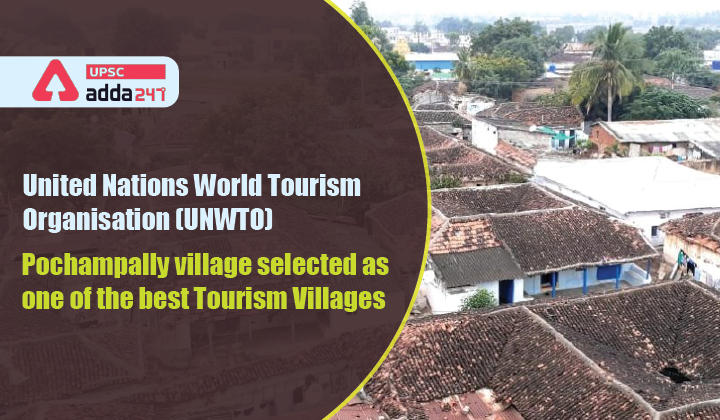Table of Contents
UNWTO and Pochampally village- Relevance for UPSC Exam
- GS Paper 1: Indian History- Indian culture will cover the salient aspects of Art Forms, Literature and Architecture from ancient to modern times.
- GS Paper 2: Governance, Administration and Challenges- Government policies and interventions for development in various sectors and issues arising out of their design and implementation.
UNWTO and Pochampally village- Context
- Recently, Telangana’s Pochampally village was selected as one of the Best Tourism Villages by United Nations World Tourism Organisation (UNWTO).
- The prestigious award will be given on the occasion of the 24th session of the UNWTO General Assembly on 2nd December 2021 in Madrid, Spain.
The Best Tourism Villages initiative by UNWTO
- About: The Best Tourism Villages by UNWTO Pilot initiative aims to award those villages which are outstanding examples of rural destinations and showcase good practices in line with its specified nine evaluation areas.
- It also aims to support villages to enhance their rural tourism potential through training and access to opportunities for improvement.
- India and Best Tourism Villages initiative: The Ministry of Tourism recommended three villages for the UNWTO Best Tourism Village entry from India. These were-
-
- Kongthong in Meghalaya,
- Ladhpura Khas, Madhya Pradesh and
- Pochampally in Telangana: Pochampally village was awarded by UNWTO.
Pochampally in Telangana: Key Points
- About Pochampally Village: Pochampally, located 50 Kms from Hyderabad, is a town in Nalgonda district of Telangana.
- Pochampally Sarees: Pochampally is often referred to as the Silk City of India for the exquisite Pochampally sarees that are woven through a unique style called Ikat.
- GI Status for Pochampally Sarees: This unique style, Pochampally silk sarees (Ikat), received a Geographical Indicator (GI Status) in 2004.
- Process of Making Pochampally Sarees: Ikat involves the process of wrapping (or tying) and dyeing sections of bundled yarn to a predetermined colour pattern before they are woven.
- The dye penetrates into exposed sections while the wrapped section remains undyed. This pattern formed by the yarn in this process is woven into fabric.
- Ikat is a Malaysian, Indonesian word that means “Tie and Dye”.
- Significance of Pochampally Village:
- In 2015, to recognise the diversity of weaving techniques and our rich handloom tradition, PM inaugurated the first National Handloom Day on August 7.
- National Handloom Day: It is celebrated every year as a tribute to the formal proclamation of the Swadeshi Movement that was made in a meeting at the Calcutta Town hall on the same day in 1905.
- Bhoodan Pochampally: Pochampally is also known as Bhoodan Pochampally to commemorate the Bhoodan Movement that was launched by Acharya Vinobha Bhave from this village on April 18th, 1951.
- Currently a two room Vinobha Bhave Mandir exists within the village which was earlier the place where Vinobha Bhave resided during his visit to the village.
UNESCO World Heritage Sites in India
Pochampally in Telangana- Steps taken by the government
- The Ministry of Tourism has drafted a Rural Tourism Policy which will not only promote tourism within our villages but also revitalise local arts and crafts and promote rural economy.
- Rural Tourism Policy will help redevelop and rebuild our villages and rural life and the residents of the villages will also get an opportunity to engage and interact with people from outside.
- Pochampally’s unique weaving styles and patterns have also received special focus through the Prime Minister’s mantra of Vocal 4 Local as a part of Atmanirbhar Bharat.
UNESCO State of Education Report 2021
United Nations World Tourism Organisation (UNWTO)
- About UNWTO: UNWTO is the United Nations Specialised Agency responsible for the promotion of responsible, sustainable and universally accessible tourism.
- United Nations World Tourism Organisation (UNWTO) was established in 1975.
- UNWTO Headquarters: UNWTO Headquarters is situated in Madrid, Spain.
- Key Mandate of UNWTO: UNWTO encourages the implementation of the Global Code of Ethics for Tourism, with an aim to maximize tourism’s socio-economic contribution while minimizing its possible negative impacts.
UNESCO World Heritage Sites in India
Also Read:
| Legislative Council: A Complete Analysis | MSME Definition Expanded: Know Everything About MSME | Mineral Conservation and Development (Amendment) Rules, 2021 | Nutrition Smart Villages |
| UN Report on Internal Migration | Combating Hidden Hunger: Rice Fortification | Global Hunger Index 2021 | SITMEX Exercise-21 |
| Unlawful Activities (Prevention) Act (UAPA), 1967 | Financial Stability Report | Impact of US Inflation in India | Freight Smart Cities: Logistics Issues and Government Steps |
| India Rejects WTO Draft on Fishery Subsidy | Project BOLD and Importance of Bamboo in India | ADR Report on Political Donations | Delhi Declaration on Afghanistan |



 TSPSC Group 1 Question Paper 2024, Downl...
TSPSC Group 1 Question Paper 2024, Downl...
 TSPSC Group 1 Answer key 2024 Out, Downl...
TSPSC Group 1 Answer key 2024 Out, Downl...
 UPSC Prelims 2024 Question Paper, Downlo...
UPSC Prelims 2024 Question Paper, Downlo...




